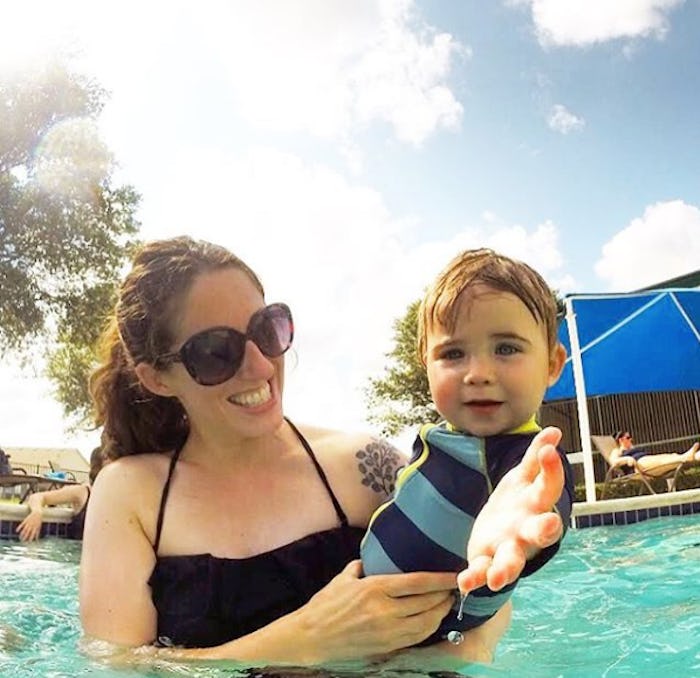Life

Your Baby Can Totally Get Too Much Sun, So Here's How To Limit Their Exposure
"Be sure to supplement with vitamin D drops," the pediatrician reminded me at my son's last check-up. "That's the only nutrient breast milk doesn't provide enough of." I was exclusively breastfeeding my 4-month-old and had picked up some of the recommended drops at his previous visit. But now that warm weather was finally here, I'd hoped to be spending more time outside together. I could still supplement, but I figured vitamin D straight from the source was even better. Yet, I was a bit hesitant. Can babies get too much sun? And how will I know how much is too much?
The old phrase "too much of a good thing" can definitely apply to babies and sunshine. As healthy as the sun can be in moderation, it becomes harmful to all human beings in large quantities, and babies are no exception. In fact, because of their largely unexposed and sensitive skin, babies suffer negative effects of the sun much quicker than you and I.
The risk most commonly associated with the sun is, of course, the chance of sunburn. But the risks don't end there. According to pediatrician Dr. Daniel Ganjian, parents with babies in the sun should also be aware of the perils of dehydration, heat rash, and other effects of UV rays.
Unfortunately, says Ganjian, there is no magic number for how long a baby can safely be exposed to the sun. The pediatrician tells Romper, "The amount of time depends on the temperature, location, and the amount of direct sunlight. But in general, try not to stay outside when temperatures are over 85 degrees."
But even in milder temps, babies are susceptible to sunburn because their skin hasn't toughened up with years of exposure like ours has. So even if your nose isn't turning pink on a 70 degree day, that doesn't mean your infant is protected in the same way.
"Therefore," says Ganjian, "keep your baby in the shade and dress him in long-sleeved clothing made from a light fabric like cotton or linen. Light colors work best. Make sure you give her plenty of fluids to keep her hydrated." And in case you're rusty on the sunscreen rules, it's safe to apply on infants who are over 6 months old. Use SPF 30, and don't forget to reapply the sunblock every two hours or whenever your little one comes out of the water for a break.
If you have a baby who is less than 6 months old, the rules are a bit more conservative. "The skin is extra sensitive before 6 months, so avoid all creams and sunblocks until then," advises Dr. Ganjian. "However, if you cannot avoid exposing your child to direct sunlight, then also apply the sunblock to your newborn. Always make sure it is hypoallergenic."
Remember, a good rule of thumb is to be aware of your own comfort level. The minute you personally start feeling uncomfortably warm, you know your baby could be at risk — and it's time to move indoors or, at the very least, to some shade.
Parents should also keep tabs on the classic signs of overheating, the pediatrician tells Romper. According to Ganjian, these signs include a fever, fewer wet diapers, uncharacteristically cranky behavior, or being overly tired. If you observe these signs in your infant after being in the sun, give her plenty of fluids, put him in a lukewarm bath, and call your pediatrician for advice on any additional measures that need to be taken.
Summer is an exciting time for families with a new baby in tow, but safety always comes first. While she does need that vitamin D for healthy bones, it's not worth taking additional risks to get it. That's what the drops are for.
Check out Romper's new video series, Bearing The Motherload, where disagreeing parents from different sides of an issue sit down with a mediator and talk about how to support (and not judge) each other’s parenting perspectives. New episodes air Mondays on Facebook.